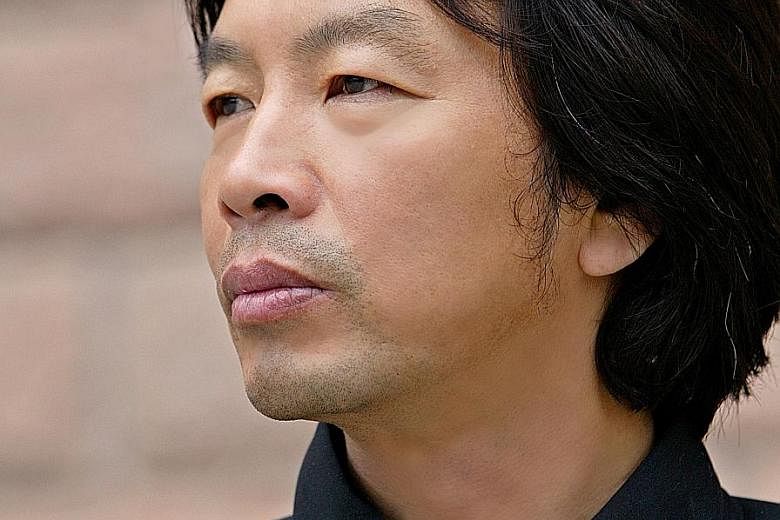Acclaimed Chinese writer Liu Zhenyun thinks of himself as a "commoner". That, he says, is how he finds the stories of the little people, the downtrodden and the unheard.
In his novels, a man can maintain that his spoilt tofu is more important than a global summit; a woman can spend 20 years protesting her virtue. Liu wants their stories to be heard - as if told by princes or presidents.
The 60-year-old, one of China's best-selling contemporary novelists, will be at the Singapore Writers Festival next month, where he will speak on a panel with local Chinese-language authors Soon Ai Ling and this year's festival literary pioneer Yeng Pway Ngon about the topic of Social Upheavals In Modern Chinese Fiction.
Liu won the prestigious Mao Dun Literature Prize in 2011 for his novel Someone To Talk To, which has sold more than 2.38 million copies and was made into a film in 2016 by director Liu Yulin, his daughter with his wife Guo Jianmei, a human rights activist.
Sales of his other books have also exceeded two million each.
That his novels make it onto the screen at all is bewildering to Liu. "The basic requirement of these is that the plot be strong and my novels do not do very well in this respect," he says in an e-mail interview in Chinese.
But renowned film director Feng Xiaogang thought otherwise. He has made numerous films and television dramas based on Liu's books, including his 2012 novel I Did Not Kill My Husband, which he turned into the 2016 film I Am Not Madame Bovary, starring Fan Bingbing.
-
BOOK IT/ SOCIAL UPHEAVALS IN MODERN CHINESE FICTION
-
WHERE: The Arts House, Blue Room, 1 Old Parliament Lane
WHEN: Nov 3, 4.30pm
ADMISSION: Festival pass event, $25 from Sistic (call 6348-5555 or go to www.sistic.com.sg)
INFO: This session is in Mandarin. Go to www.singaporewriters-festival.com
-
FILM SCREENING: I AM NOT MADAME BOVARY
-
WHERE: The Arts House, Screening Room
WHEN: Nov 4, 5pm
ADMISSION: Festival pass event, $25
INFO: Rated PG13. The film is in Mandarin with English subtitles. The post-show dialogue with the author is in Mandarin
The book revolves around the lonely quest of a peasant woman, Li Xuelian, to clear her name. The mother of two fakes a divorce with her husband to sidestep China's one-child policy, only to find out he has really divorced her to marry someone else.
In their subsequent fight, he accuses her of being a Pan Jinlian, a famous adulteress from Chinese literature. This was changed in the film's translated title to Madame Bovary, the unfaithful wife of Gustave Flaubert's 1857 French novel.
Li Xuelian tries to hire men to kill her ex-husband, sues various court officials for dismissing her case and disrupts the Beijing National People's Congress, all to protest the smear on her reputation. She carries on this crusade for 20 years.
The root of the novel, says Liu, is "something so absurd that you don't know whether to laugh or cry". Yet he has great sympathy for a nobody like Li Xuelian. "The world thinks this woman is not important, but I feel she is."
Now that his book has been translated into more than 20 languages and turned into a film, readers the world over join him in listening to her side of the story. "This is the power of literature. This is also the value of an author."
Liu was born in Henan, a province in China historically fraught with war and famine. In 1942, a drought caused three million people to starve to death, which Liu writes about in his 2009 novella Remembering 1942.
Somehow, he says, this has imbued the people of Henan with a peculiar sense of black humour. He describes a scene from Remembering 1942 in which Old Zhang, fleeing his home town, thinks upon his friend Old Li, who starved to death three days ago. "I've outlived Old Li by three days," he tells himself. "It's worth it."
Humour is an important coping mechanism, he says. "When there are too many disasters, treating the situation with a serious attitude will turn it into a piece of metal and humans will break on it like eggs.
"But if you treat it with humour, it becomes a piece of ice. When it falls into the sea of humour, it will melt."
The son of a lowly county employee and an illiterate provision store worker, he left home as a teenager to join the army, then quit that to become his province's top scorer at the national college entrance examination in 1978.
After a stint as a journalist, he went on to write 14 books, the most recent of which is the experimental novel Strange Bedfellows (2017), which touches on the "watermelon eaters" - a colloquial phrase to describe bystanders who gain pleasure watching others suffer.
Winning awards and having books adapted for film mean his novels can travel farther, but he is careful to add that it does not change a word of his work. "Your writing standard will not improve just because you win prizes, so you must be clear-headed about this. What is more important is how well you write your next book."
• Someone To Talk To ($43.28), I Did Not Kill My Husband ($38.63) and Remembering 1942 ($38.69) are available from Books Kinokuniya. Liu Zhenyun's books are also available at National Library Board libraries.


